
 i_need_contribute
i_need_contribute

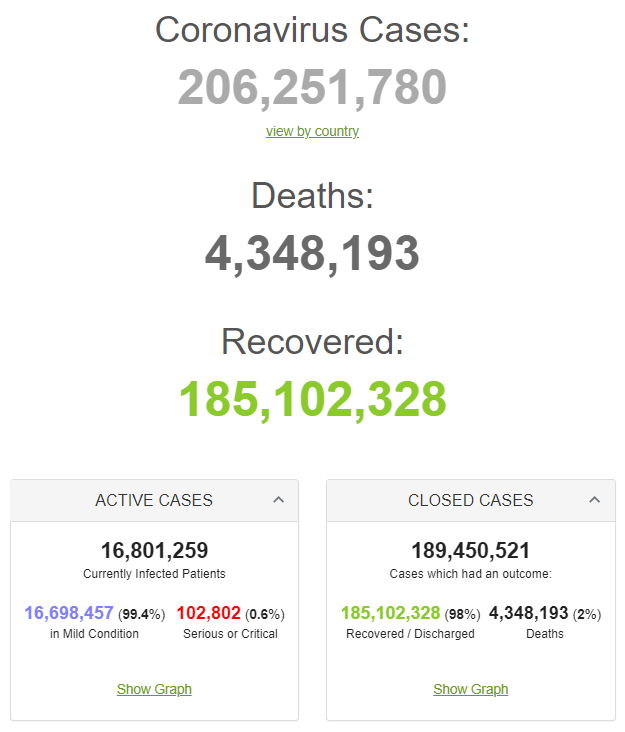
| Country, | Total | New | Total |
| Other | Cases | Cases | Deaths |
| World | 206,181,961 | 713,183 | 4,347,175 |
| USA | 37,203,649 | 143,537 | 636,298 |
| India | 32,117,052 | 40,078 | 430,285 |
| Brazil | 20,285,067 | 35,891 | 566,988 |
| Russia | 6,534,791 | 21,932 | 168,049 |
| France | 6,398,983 | 28,554 | 112,487 |
| UK | 6,179,506 | 33,074 | 130,701 |
| Turkey | 6,018,485 | 22,261 | 52,703 |
| Argentina | 5,066,253 | 13,369 | 108,569 |
| Colombia | 4,856,595 | 4,272 | 123,097 |
| Spain | 4,677,883 | 17,410 | 82,407 |
| Italy | 4,420,429 | 7,270 | 128,334 |
| Iran | 4,320,266 | 39,049 | 96,215 |
| Germany | 3,814,316 | 5,506 | 92,348 |
| Indonesia | 3,774,155 | 24,709 | 113,664 |
| Mexico | 3,020,596 | 22,711 | 246,203 |
| Poland | 2,884,780 | 223 | 75,291 |
| South Africa | 2,568,511 | 14,271 | 76,247 |
| Ukraine | 2,262,601 | 1,247 | 53,173 |
| Peru | 2,130,018 | 1,502 | 197,209 |
| Netherlands | 1,894,667 | 2,563 | 17,894 |
| Iraq | 1,751,176 | 10,243 | 19,466 |
| Philippines | 1,700,363 | 12,439 | 29,539 |
| Czechia | 1,675,675 | 223 | 30,372 |
| Chile | 1,626,594 | 1,138 | 36,243 |
| Canada | 1,447,446 | 2,141 | 26,692 |
| Bangladesh | 1,396,868 | 10,126 | 23,613 |
| Malaysia | 1,342,215 | 21,668 | 11,691 |
| Belgium | 1,145,736 | 2,609 | 25,282 |
| Sweden | 1,109,112 | 14,621 | |
| Romania | 1,086,109 | 371 | 34,334 |
| Pakistan | 1,085,294 | 4,934 | 24,187 |
| Japan | 1,069,554 | 15,792 | 15,330 |
| Portugal | 995,949 | 2,708 | 17,525 |
| Israel | 924,762 | 5,340 | 6,604 |
| Thailand | 839,771 | 22,782 | 6,942 |
| Hungary | 810,212 | 86 | 30,037 |
| Jordan | 780,542 | 1,012 | 10,173 |
| Switzerland | 733,275 | 2,125 | 10,918 |
| Morocco | 731,084 | 10,828 | 10,711 |
| Serbia | 729,150 | 983 | 7,152 |
| Nepal | 725,769 | 2,473 | 10,212 |
| UAE | 698,166 | 1,260 | 1,992 |
| Austria | 665,885 | 850 | 10,753 |
| Kazakhstan | 664,524 | 7,747 | 7,208 |
| Tunisia | 618,124 | 1,360 | 21,310 |
| Lebanon | 578,367 | 1,817 | 7,962 |
| Saudi Arabia | 536,693 | 766 | 8,378 |
| Greece | 528,474 | 3,603 | 13,126 |
| Ecuador | 493,767 | 619 | 31,870 |
| Cuba | 491,904 | 8,194 | 3,757 |
| Bolivia | 480,229 | 770 | 18,109 |
| Georgia | 466,326 | 5,128 | 6,279 |
| Belarus | 457,422 | 1,175 | 3,572 |
| Paraguay | 456,291 | 227 | 15,383 |
| Panama | 445,651 | 956 | 6,932 |
| Bulgaria | 431,292 | 882 | 18,321 |
| Costa Rica | 426,474 | 2,002 | 5,199 |
| Kuwait | 405,442 | 555 | 2,380 |
| Guatemala | 403,348 | 4,358 | 10,960 |
| Slovakia | 393,302 | 74 | 12,544 |
| Uruguay | 382,997 | 124 | 5,996 |
| Croatia | 366,049 | 333 | 8,278 |
| Azerbaijan | 359,732 | 2,674 | 5,109 |
| Dominican Republic | 345,325 | 207 | 3,975 |
| Sri Lanka | 345,118 | 3,039 | 5,620 |
| Myanmar | 344,730 | 3,430 | 12,667 |
| Denmark | 327,972 | 1,085 | 2,555 |
| Palestine | 319,223 | 486 | 3,621 |
| Ireland | 318,937 | 1,733 | 5,059 |
| Venezuela | 316,449 | 951 | 3,764 |
| Honduras | 312,192 | 1582 | 8,310 |
| Oman | 299,642 | 224 | 3,974 |
| Lithuania | 288,173 | 599 | 4,438 |
| Ethiopia | 287,184 | 898 | 4,452 |
| Egypt | 285,061 | 95 | 16,604 |
| Libya | 276,739 | 2286 | 3,835 |
| Bahrain | 270,590 | 139 | 1,384 |
| Moldova | 261,524 | 268 | 6,298 |
| Slovenia | 260,867 | 248 | 4,433 |
| Vietnam | 246,568 | 9,667 | 4,813 |
| Armenia | 233,400 | 399 | 4,669 |
| Qatar | 228,543 | 197 | 601 |
| S. Korea | 218,192 | 1986 | 2,138 |
| Kenya | 217,276 | 1,546 | 4,273 |
| Bosnia and Herzegovina | 206,835 | 180 | 9,698 |
| Zambia | 201,770 | 428 | 3,512 |
| Algeria | 185,042 | 851 | 4,695 |
| Nigeria | 180,661 | 753 | 2,200 |
| Mongolia | 178,436 | 1,443 | 869 |
| Kyrgyzstan | 170,770 | 417 | 2,426 |
| North Macedonia | 159,908 | 639 | 5,527 |
| Afghanistan | 151,770 | 207 | 7,000 |
| Norway | 142,895 | 307 | 807 |
| Uzbekistan | 140,210 | 925 | 956 |
| Latvia | 139,814 | 107 | 2561 |
| Botswana | 136,758 | 5987 | 1,973 |
| Mozambique | 136,566 | 1038 | 1,671 |
| Estonia | 136,228 | 378 | 1,279 |
| Albania | 134,761 | 274 | 2,460 |
| Namibia | 121,817 | 214 | 3,244 |
| Australia | 37,754 | 376 | 947 |
| Suriname | 26,318 | 96 | 672 |
Retrieved from:https://www.worldometers.info/coronavirus/
By Gabriella Borter and Sharon Bernstein

A sign reminding people to wear masks is seen in Golden Gate Park ahead of the stay-at-home order in attempts to stem coronavirus spikes in San Francisco, California, U.S., December 6, 2020. REUTERS/Stephen Lam
The cities of San Francisco and New Orleans on Thursday ordered patrons to show proof of COVID-19 vaccinations to enter restaurants, gyms and other venues, joining New York in a severe step designed to contain the fast-spreading Delta variant.
The move by the two liberal cities came on the same day that school board members in Houston voted to support a mandate by the district superintendent to require students to wear masks in classrooms and on school buses.
One Houston school board member, Judith Cruz, said she would also support requiring children to be vaccinated. That suggestion was not formally considered on Thursday.
The Houston mask order sets up a potential clash between local officials and Republican Governor Greg Abbott, who has banned such mandates.
As the start of the academic year coincides with a rise in COVID-19 infections linked to the Delta variant, schools have become the flashpoint in a national debate over the authority of state, federal and local governments to order masks and vaccines.
The number of daily nationwide infections has doubled in the last two weeks, according to a Reuters tally, reaching a six-month peak. The average number of daily deaths has increased 85% in that same time span.
In Virginia, where some school district officials have said they would not require students to wear masks, Governor Ralph Northam, a Democrat, issued an order on Thursday requiring them.
Florida Governor Ron DeSantis, a Republican, has threatened to withhold the salaries of school officials who require students to cover their faces, defying the administration of U.S. President Joe Biden, a Democrat.
The White House is considering reimbursing Florida school officials if DeSantis, who is considered a possible presidential candidate in 2024, follows through with his threat.
The Delta variant appears to be slowing the pace of a U.S. economic recovery after an upswing in the first half of 2021, according to Oxford Economics U.S. Recovery Tracker.
'PHYSICAL AND MENTAL EXHAUSTION'
"Sharply deteriorating health conditions are the main reason why the South’s recovery is now losing momentum," Oxford's lead U.S. economist Oren Klachkin said.
The worst of the U.S. COVID outbreak is concentrated in the South, including Arkansas, Florida, Louisiana, Mississippi and Texas, where intensive care units have been stretched to capacity. Florida has asked Washington to send more ventilators to the state while at the same time flouting federal mask recommendations.
"Our frontline health care heroes are finding themselves stretched thin and physical and mental exhaustion is taking its toll," Florida Hospital Association President Mary Mayhew said in a statement on Tuesday.
San Francisco's new vaccine mandate for indoor businesses extends to employees as well as patrons. Employees of restaurants, gyms and other venues have until Oct. 13 to show proof of full vaccination, the order says.
Proof of vaccination will also be required for attendees at indoor events of 1,000 people or more.
San Francisco's mandate, which begins Aug. 20, requires proof of full vaccination. The New York and New Orleans health orders require only one dose.
Both the Pfizer (PFE.N) and Moderna (MRNA.O) vaccines require two doses several weeks apart. Johnson and Johnson (JNJ.N) has a one-dose vaccine.
California, Illinois, Kentucky and New Jersey, all led by Democratic governors, have required masks in all schools.
On Thursday, the National Education Association President Becky Pringle, who leads the largest teachers' union in the country, said she supported vaccine mandates for teachers. Her statement followed a similar endorsement from the American Federation of Teachers' president earlier this week.
Retrieved from:https://www.reuters.com/world/us/houston-join-schools-rebelling-against-state-bans-mask-mandates-2021-08-12/
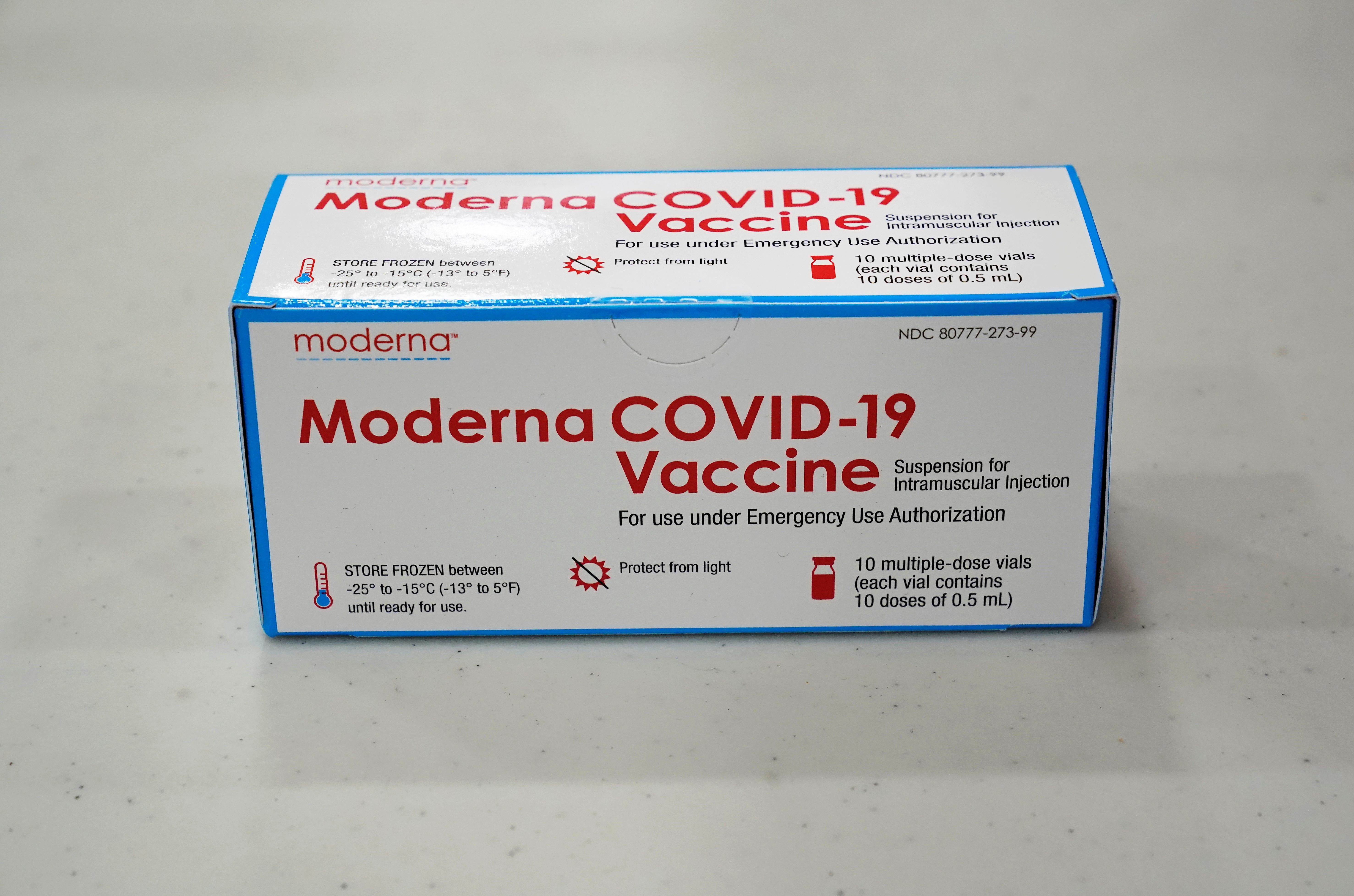
One of the boxes containing the Moderna COVID-19 vaccine is prepared to be shipped at the McKesson distribution center in Olive Branch, Mississippi, U.S. December 20, 2020. Paul Sancya/Pool via REUTERS
The U.S. Food and Drug Administration on Thursday authorized a booster dose of COVID-19 vaccines from Pfizer Inc (PFE.N) and Moderna Inc (MRNA.O) for people with compromised immune systems.
A few other countries, such as Israel and Germany, plan to or have already administered the third shot to avoid another crisis due to the contagious Delta variant of the coronavirus.
Scientists are still divided over the broad use of COVID-19 vaccine boosters among those without underlying problems as benefits of the boosters remain undetermined.
Pfizer has said the efficacy of the vaccine it developed with BioNTech drops over time, citing a study that showed 84% effectiveness from a peak of 96% four months after a second dose.
Moderna has also said it sees the eventual need for booster doses, especially since the Delta variant has caused "breakthrough" infections in fully vaccinated people.
The U.S. health regulator on Thursday amended the emergency use authorizations for the vaccines to allow an additional dose in certain individuals, specifically for recipients of solid organ transplant or those diagnosed with conditions that are considered to have an equivalent level of immunocompromise.
Reports of infections among vaccinated people and concerns about diminishing protection have galvanized wealthy nations to distribute booster shots, even as many countries struggle to access first vaccine doses.
The World Health Organization last week called for a moratorium on COVID-19 vaccine booster shots until at least the end of September.
Spurred by the Delta variant, coronavirus cases in the United States have spiked to their highest levels in more than six months, according to a Reuters tally.
Those with weak immune systems may not be sufficiently protected by their existing COVID-19 vaccinations, U.S. health officials have said. read more
U.S. regulators must fully authorize the COVID-19 vaccines or amend their emergency use approvals before officials can recommend additional shots. A panel of advisers to the U.S. Centers for Disease Control and Prevention will meet on Friday to discuss eligibility of immunocompromised individuals for booster doses.
Wall Street analysts expect the authorization of a booster dose for a broad population to bolster profits of COVID-19 vaccine makers, as hundreds of millions of fully inoculated people will come back for an extra dose.
Retrieved from:https://www.reuters.com/world/middle-east/us-fda-authorizes-covid-19-vaccine-boosters-immunocompromised-2021-08-13/
By Abdul Rahman Muchtar
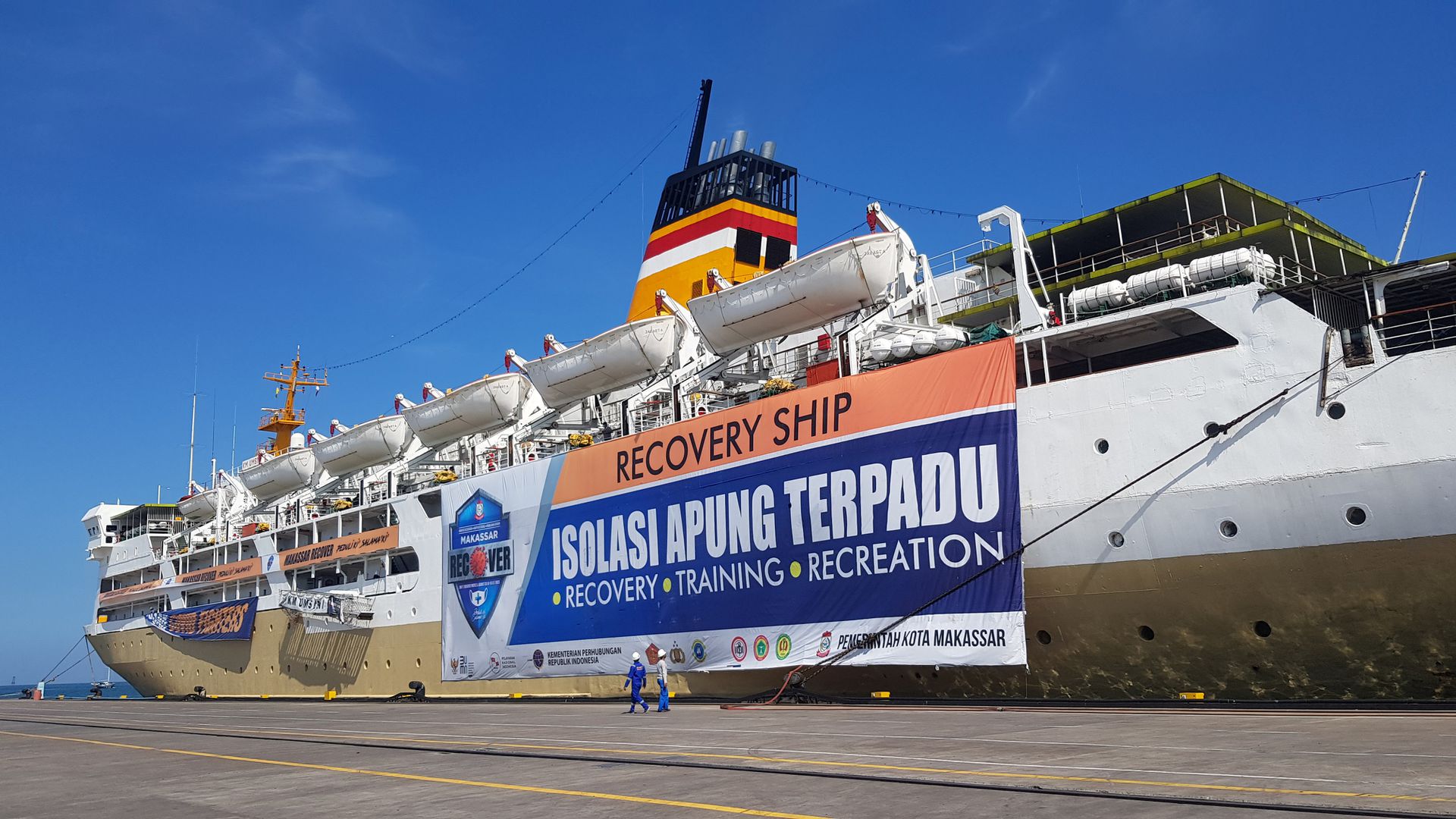
A giant banner reading 'Recovery Ship: Integrated Floating Isolation - Recovery, Training, Recreation' is seen on a passenger ship owned by the state-owned shipping company PT PELNI, KM Umsini, which has been modified as an isolation centre for the coronavirus disease (COVID-19) patients in Makassar, South Sulawesi province, Indonesia, August 9, 2021. Picture taken August 9, 2021. REUTERS/Abd. Rahman Muchtar
A vehicle with a flashing siren and "Makassar COVID Hunter" written on the side pulls up to a ship docked at a jetty in the Indonesian port city of Makassar, and masked COVID-19 patients carrying bags board the boat.
This ship, called the KM Umsini, used to ply a route ferrying up to 2,000 passengers between Indonesia's island cities. Now, it has been turned into an isolation centre for COVID-19 patients with mild symptoms, amid the spread of the highly infectious Delta coronavirus variant.
Over 800 beds have been installed and sixty medical workers take turns in shifts to help patients recover.
The patients have to spend 10 days in isolation, during which time they undergo routine medical check-ups and can partake of exercise to music and fishing from the ship's deck.
"I chose to isolate here because I think this is unique and it's a new thing in Makassar," said one patient, Mitha Andriyanti. "Also the location is far from the city, so we won't spread the coronavirus to others."
Indonesia, which has one of Asia's worst COVID-19 epidemics, implemented restricted mobility on its Java and Bali islands in early July to stem the spread of the Delta variant, and has since extended this to other areas with high infection rates.
This has impacted the more than 8.8 million people who live in South Sulawesi province, where Makassar is located. Makassar has seen a surge in COVID-19 cases since early July, which it has scrambled to contain with limited supplies and facilities.
"We recorded today at least 3,000 people with COVID-19 but no symptoms are self-isolating at home and we can't trace their homes," said Makassar Mayor Mohammad Ramdhan Pomanto.
"This is very dangerous, that's why we are using this integrated floating isolation on the Umsini ship as part of our effort while we look for those people and persuade them to come to this facility."
Retrieved from:https://www.reuters.com/world/asia-pacific/indonesian-ferry-turns-floating-isolation-centre-covid-19-patients-2021-08-13/
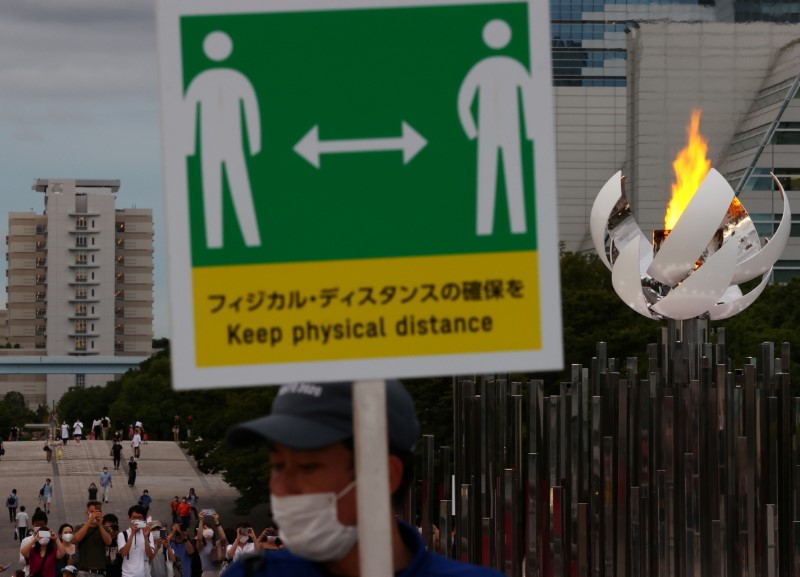
A staff wearing a protective mask, amid the coronavirus disease (COVID-19) outbreak, holds a social distance sign in front of the second Olympic flame cauldron of Tokyo 2020 Olympic Games in Tokyo, Japan, August 7, 2021. REUTERS/Kim Kyung-Hoon
Japan's top health adviser said on Thursday he would request stricter emergency measures for about two weeks to tackle a spike in COVID-19 cases in Tokyo and other areas.
Shigeru Omi told reporters the contagion should treated as a natural disaster and he called on the government to increase testing to find and contain the spread.
A few days after the end of the Tokyo Olympics, the capital reported 4,989 new daily cases on Thursday, down slightly from record 5,042 last week. The new number of patients with serious symptoms increased to an all-time daily high of 218.
There has been no evidence that the Olympics directly increased case numbers in Japan, but health experts have warned that holding the Games could have encouraged people to relax infection controls.
Japan is vaccinating more than 1 million people a day, but it still lags many major economies in inoculating its population.
Tokyo is already under a state of emergency, the fourth so far in the pandemic, though some experts have said it should be expanded to cover the whole country. The western prefecture of Osaka reported a record 1,654 new cases on Thursday.
Hospital beds are filling up rapidly, mainly with patients in their 40s and 50s, Omi said. To try to break the chain of infection, he said, authorities should try to reduce human mobility to about 50% of the average in July.
His comments echoed those of a separate panel of experts who said on Thursday contagion in Tokyo had become uncontrollable.
"The number of new positive cases is rapidly increasing, making it impossible to control the situation," Norio Ohmagari, a health adviser to the Tokyo Metropolitan Government, told a panel chaired by Governor Yuriko Koike.
Koike urged residents to avoid travel and stay home to slow the transmission of COVID-19, which is causing hospitals to have to forego some standard medical care.
Retrieved from:https://www.reuters.com/world/asia-pacific/top-japan-health-adviser-wants-stricter-covid-19-measures-about-two-weeks-2021-08-12/
By Kim Willsher
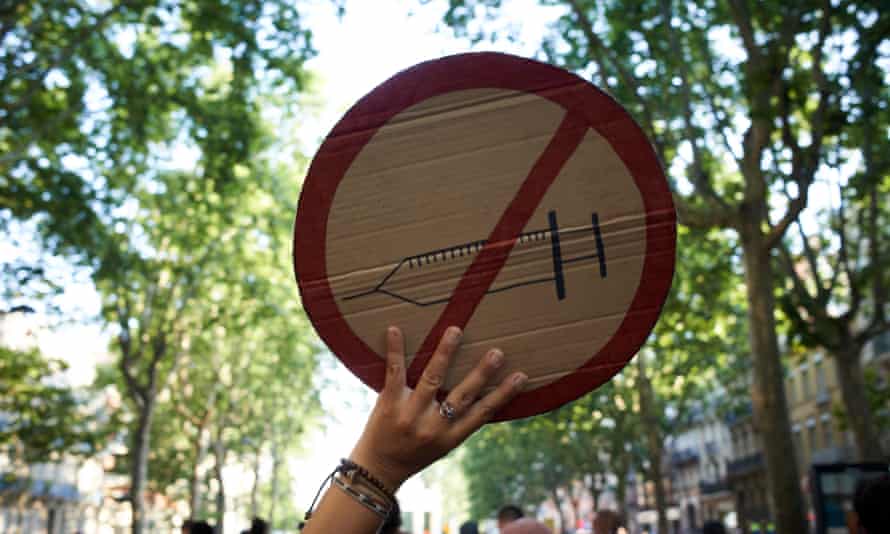
Protests against the health pass have been held across France for weeks. Photograph: Alain Pitton/NurPhoto/Rex/Shutterstock
French police have been urged to step up security around Covid vaccination and testing centres after a spate of attacks and vandalism in the last month.
As France prepares for a fifth weekend of demonstrations against the health pass, the interior minister, Gérald Darmanin, has written to police chiefs calling for greater vigilance. French media reported that the request had come directly from Emmanuel Macron.
It came after the ministry reported that 22 health sites had been vandalised, including five test centres, 15 vaccination centres, a medical laboratory and a health centre, since 12 July.
A number were sprayed with swastikas or graffiti reading “collabos” (collaborators), “Nazi” or “genocide”, or yellow stars.
The vandalism has mostly occurred during demonstrations against the pass sanitaire, a document people must present to prove they are either fully vaccinated, have tested negative for Covid-19 or have recovered from the coronavirus, in order to be allowed access to a number of public places, including hospitals – except for emergency treatment – gyms, sports facilities, cinemas, restaurants, bars and swimming pools.
Protesters claim the health pass is a threat to personal and civil liberties. More extreme attacks have likened the government to second world war fascists and the pass to the Nazi treatment of Jews.
The health pass was introduced last month, but was extended to cover more establishments on Monday.
France’s health minister, Olivier Véran, has written to health professionals expressing his support for those who have been subject to threats and aggression and to “strongly condemn” any acts of violence.
“In recent weeks, while once again responding to the call to vaccinate the population and to increase our testing capacity in order to curb the epidemic, several of our professionals have been cowardly attacked for doing their job,” Véran wrote.
“I will not accept any violence, intimidation, attack on their physical integrity or their professional tools.” He added: “To attack our health professionals is to attack the nation.”
Last month, a vaccine centre at Lans-en-Vercors in the Isère was flooded by vandals using a fire hose, damaging the building and equipment. “Vaccines are a new genocide”, “1940” and “assassins” were graffitied on the building.
After a weekend demonstration earlier this month, the National Order of Pharmacists, which represents pharmacy staff, condemned a “sudden outburst of violence” against members.
“They have been taken to task, been insulted, had their [vaccine] tents vandalised and have had their [pharmacies] burned down,” it said in a statement.
Last Saturday, about 237,000 people demonstrated against the health pass across France, according to official figures.
However, Macron’s vaccine encouragement appears to be working: an estimated 9.3 million people have received at least one vaccine dose since the president announced the health pass, and France is now vaccinating just under 300,000 people a day.
Véran said 45 million French adults had received at least one dose of vaccine, representing 80% of the population aged over 18. France has also vaccinated 12- to 17-year-olds since May.
Retrieved from:https://www.theguardian.com/world/2021/aug/12/french-police-on-alert-after-covid-testing-centre-attacks
By RAÚL LIMÓN
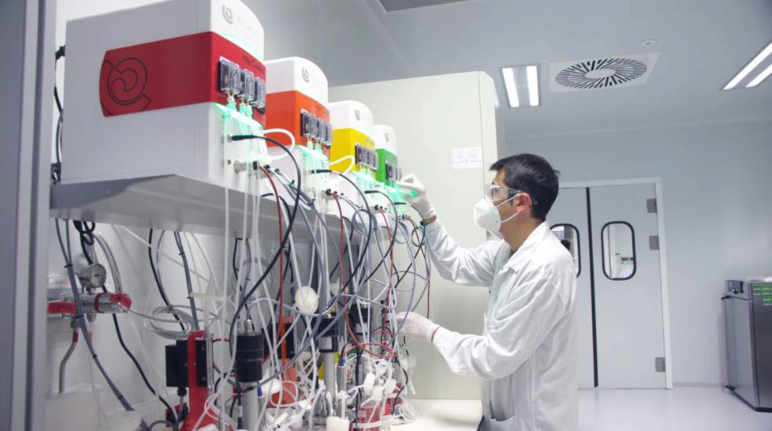
A scientist from the Spanish company Hipra.HIPRA
The Spanish Agency of Medicine and Health Products (AEMPS) authorized on Wednesday the first human clinical trial of the PHH-1V vaccine against Covid-19, developed by the Spanish pharmaceutical company Hipra. This is the first time a Spanish Covid-19 vaccine has been approved for human trials.
The Phase 1 trial is aimed at testing safety, tolerance, immunogenicity (the ability to provoke an immune response) and effectiveness. It will compare the PHH-1V vaccine candidate against other vaccines that have been authorized for use in humans. Thirty people between the ages of 18 and 30 are expected to be involved in this first phase. The vaccine will be tested on volunteers who have not had the coronavirus nor a single dose of a Covid-19 vaccine. Volunteers will also not know if they are receiving the PHH-1V vaccine or if they are in the control group, which will be given two doses of an authorized vaccine that uses RNA messenger technology, such as the Pfizer-BioNTech, at a three-week interval.
An independent committee will monitor the volunteers for any possible adverse effects or cases of infections. The trial is expected to take months, but AEMPS has not outlined a specific timeframe. According to Hipra, it would be able to begin the manufacturing phase in just over 60 days, and expects to have authorization from the European Medicines Agency (EMA) by the first quarter of 2022.
According to AEMPS, the PHH-1V vaccine “is based on two recombinant proteins that are structurally similar, one corresponding to the alpha variant and the other to the beta variant, that together form a unique structure called a dimer, and that are accompanied by a component that increases the immune response.” This combination is able to provoke an immune response to one of the proteins of the SARS-CoV-2 virus, known as the spike-shaped S protein, which helps the virus enter human cells and destroy them.
This is the same method used by the Novavax and Sanofi/GSK vaccines, which are currently being reviewed by the European Medicines Agency (EMA) for possible authorization. Unlike these vaccines, however, Spain’s PHH-1V has proteins from two different variants, as it was modified to be more effective against new mutations of the coronavirus.
Ahead of the AEMPS’s green light, Toni Maneu, the head of Human Health at Hipra, said that the results of the pre-clinical trials (in laboratories and on animals) indicated that the PHH-1V vaccine was even effective against the more contagious delta strain, which is now dominant in Spain.
From 400 million to 1.2 billion doses
The Spanish company Hipra, which is based in Amer in Girona province, reported that it would be able to produce 400 million doses of the PHH-1V vaccine throughout 2022. The vaccine does not need to be stored at ultra-cold temperatures, and can be kept at temperatures of between 2ºC and 8ºC, which makes storage and distribution easier.
If the results of the human trial are positive, the company forecasts that it will be able to begin production in October and deliver the first shipment of 75 million doses by the end of this year. If all goes to plan, Hipra expects that it will be able to deliver 400 million doses in 2022 and scale up to 1.2 billion in 2023.
Hipra specializes in animal immunology and has more than half a century of experience. But as the company explains on their website: “Viruses that affect animals and humans have great biological similarities, so our know-how and experience in epidemiology provide high added value.”
Hipra has more than 2,000 employees working across the world and 39 operating and distribution subsidiaries. The company also has two production plants, in Spain and Brazil, three Research and Development centers in these two countries as well as the United States and 11 diagnostic centers globally.
Other vaccine candidates from Spain
The decision to authorize the PHH-1V vaccine for human clinical trials comes two weeks after another vaccine candidate, developed by Spain’s research agency CSIC, was denied the same authorization. This team, led by virologist Mariano Esteban, had requested permission to begin a Phase 1 trial from the AEMPS, but the agency said it needed to see more data before it could give the green light. The team is now working to provide this information.
The Spanish Health Ministry and Science Ministry are also supporting a vaccine candidate, developed by researchers Luis Enjuanes and Isabel Sola. This candidate features a prototype of an RNA messenger and is currently being trialed on animals.
Retrieved from:https://english.elpais.com/science-tech/2021-08-12/first-spanish-covid-19-vaccine-approved-for-human-clinical-trial.html
Hello and welcome to today’s live coverage of the coronavirus pandemic.
Thailand reported 23,418 new coronavirus infections on Friday, a record increase for a second day in a row, bringing the total accumulated cases to 863,189, as the country deals with its biggest outbreak to date.
Meanwhile, South Korean prime minister Kim Boo-kyum urged people to minimise holiday travel and asked companies to show flexibility in letting people work from home amid a worsening fourth wave of and a shortage of vaccines in the country.
We’ll have more on these stories shortly. In the meantime here are the other key recent developments:
· US regulators are reportedly set to recommend a third shot for people with certain immune-compromising conditions, following pressure from Pfizer. Dr Anthony Fauci said for other vaccinated groups, such as elderly people, data is being collected to determine if or when their protection goes “below a critical level” and “that’s when you’re going to be hearing about the implementation of boosters” for others.
· The Canadian prime minister, Justin Trudeau, is planning a snap election for 20 September ostensibly to seek voter approval for the government’s costly plans to respond to the pandemic, according to sources cited by Reuters. The Liberals plan to inject an extra C$100bn – between 3% and 4% of GDP – into the economy over the next three years.
· Israel is to require Covid tests from next week for children as young as three to enter schools, swimming pools, hotels or gyms as infections rise despite extensive adult vaccinations.
· French police were urged to step up security around Covid vaccination and testing centres after a spate of attacks and vandalism.
· A 99% emergency tax on the startling levels of profit made by billionaires during the pandemic could pay for everyone to get vaccinated and provide a £14,000 cash grant to all unemployed workers, according to a new analysis.
· Air passengers to the UK have spent at least £500m on PCR Covid-19 tests from private companies since mid-May, only for the NHS to be saddled with extra costs when firms fail to deliver them.
· The England and Wales Cricket Board warned that the integrity of the upcoming Ashes series was at stake unless the Australian authorities softened the nation’s hard-line stance over its strict quarantine rules, with around 38,000 Australian nationals remaining stranded abroad and unable to return home.
· Jacinda Ardern said that New Zealand would continue to pursue its ambitious Covid-19 elimination strategy indefinitely, even though a leading expert said this week that reaching herd immunity is “not a possibility” since the vaccines do not stop the spread of Covid.
· Symptoms of depression and anxiety symptoms among children and adolescents during the pandemic may have doubled compared with pre-2020 estimates.
· A McDonald’s franchise in California settled with a group of workers who sued after they were allegedly provided dog nappies to wear as masks, before a Covid outbreak among staff and subsequently their families.
Retrieved from:https://www.theguardian.com/world/live/2021/aug/13/coronavirus-live-news-who-expert-wuhan-lab-south-korea